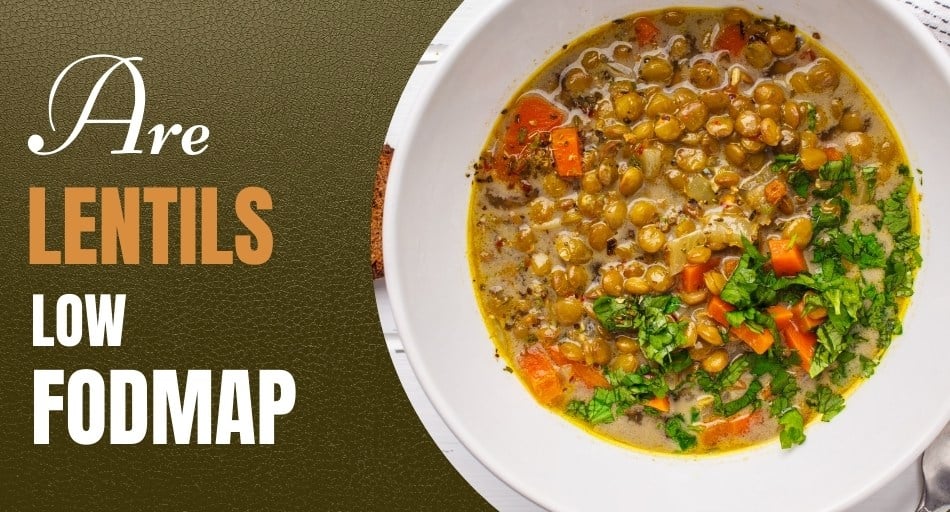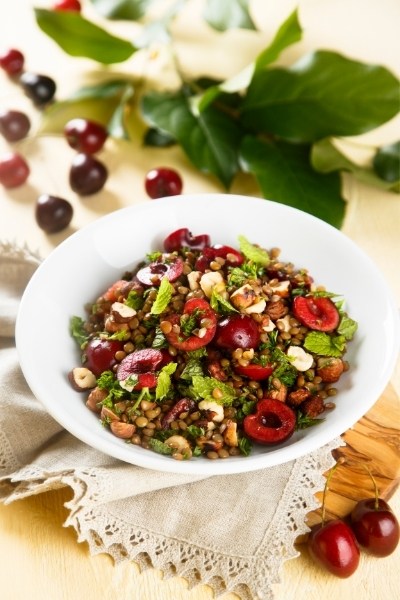Following a low FODMAP diet can be beneficial for people with IBS. Since FODMAPs are indigestible carbs, eating too many of them by people with IBS can trigger various unpleasant symptoms.

So, when following a diet low in FODMAPs, it’s important to know which foods are safe for such a diet.
For example, most legumes tend to be high in carbs and FODMAPs. So, are they allowed on a low FODMAP diet?
Let’s take a look at lentils – are they high or low in FODMAPs?
Table of Contents
Are Lentils Low FODMAP?
In small servings, lentils are a safe food for a low FODMAP diet. In larger servings, though, they can trigger some IBS symptoms. So, make sure to stick to a small serving and eat them as part of a balanced diet.
On the bright side, lentils are a great source of protein, especially for people who don’t eat meat. This kind of legume also contains a lot of plant compounds, minerals, and vitamins.
So, eating lentils can improve your health and prevent diseases.
How low in FODMAPs are lentils?

Cooked lentils, both green and red, are low in FODMAPs in a serving of ¼ of a cup (23 g). This isn’t a lot, so make sure to stick to this serving, particularly if your IBS symptoms are very severe.
All kinds of lentils contain around the same amounts of FODMAPs. So, you can have all of them on a low FODMAP diet, as long as you stick to the recommended serving.
Can you eat lentils on a low FODMAP diet?
In small quantities and servings, lentils can be a part of a diet low in FODMAPs. The best serving that’s considered low in FODMAPs is about ¼ of a cup of cooked lentils.
So, make sure to stick to that, especially if you’re just starting your low FODMAP journey.
Can you lower the FODMAP content of lentils?
While it’s hard to significantly lower the content of FODMAPs in lentils, there are some ways that can help.
One of the best ways to reduce the FODMAP content in lentils is to soak this type of legume and then drain it before cooking (or alternatively, cook them and drain them).
This can reduce the FODMAP content, making lentils easier for your digestive system to handle.

Also, make sure to stick to a small serving. This is important because the more lentils you consume, the more FODMAPs you’re also ingesting.
Is lentil soup low in FODMAPs?
As long as you make it yourself and don’t use too many lentils, you can safely incorporate small amounts of lentil soup into your diet.
But when doing so, make sure that you’re not adding any high-FODMAP ingredients like onions or garlic.
Also, keep in mind to consume small quantities of lentil soup, as it still does contain FODMAPs.
So, make sure to practice moderation.
Are canned lentils low in FODMAPs?
Canned lentils are slightly lower in FODMAPs than freshly cooked lentils. This is because they have undergone a process of canning that removed a lot of FODMAPs.
So, if you’re eating canned lentils, you can eat ½ cup in a single sitting without triggering any IBS symptoms or other digestive system issues.
Are lentils good for you?
Lentils are an incredibly healthy and nutritious legume. In fact, a one-cup serving of lentils provides you with 63% of your daily need for fiber.
This is an impressive amount, so even if you eat ½ cup of lentils, you’re still getting a lot of this nutrient.
Fiber helps feed the ‘good’ gut bacteria in your stomach, which help keep your digestive system healthy, preventing various health problems.

This nutrient also helps soak up excess stomach acid, improving the symptoms of acid reflux and GERD.
So, it’s important to consume a lot of fiber-rich foods.
Lentils are also an excellent source of protein, containing 36% of your daily need for this nutrient in a one-cup serving.
Protein is a building block for your muscles, and it also helps fill you up as you’re eating. So, getting enough protein with each meal can prevent overeating, helping you maintain a healthy weight or shed some pounds.
One cup of lentils also provides you with almost all your daily need for folate. Also known as folic acid or vitamin B9, this nutrient is important for the formation of red blood cells and for the healthy growth and function of your cells.
Folate is also often supplemented during pregnancy, as it reduces the risk of birth defects of the brain and spine.
So, since lentils are such an impressive source of this nutrient, it’s a great idea to include them in your diet.
In addition, lentils contain a great dose of copper. This mineral helps maintain healthy bones, nerves, blood vessels, and immune functions.
It also works together with iron to ensure its absorption and form red blood cells.
Because of that, getting enough copper can reduce your risk of osteoporosis, bone fractures, and various cardiovascular diseases.
Lentils are often consumed as an alternative to meat for those on plant-based diets. Because of that, it’s good to know that lentils contain a lot of nutrients that many people who don’t consume meat lack.

For example, lentils provide you with a great amount of B vitamins, iron, phosphorus, and protein.
So, eating lentils in place of meat – even if you do it sometimes – can help you stay healthy and reduce your consumption of animal-based products.
As a result, making lentils a part of a healthy, balanced diet is very beneficial.
Conclusion
Lentils, just like all other types of legumes, contain FODMAPs. Because of that, they’re only suitable for a low FODMAP diet in small servings. So, make sure to practice moderation when eating lentils if you deal with IBS.
If you can tolerate lentils, it’s a good idea to have some from time to time. They are rich in fiber, protein, and many vitamins and minerals.
So, eating them can improve your health and contribute to your overall wellbeing.
Sources: Nutrition Data, PMC, and National Library of Medicine
